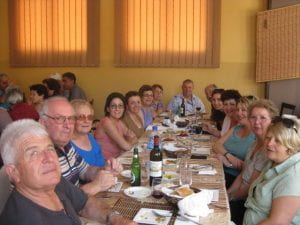In 2011, my eldest daughter and I joined a group of our Italian community and went on a tour of Israel! Mostly they were nonni, with a few of us young ones thrown in for balance hehehe. Oh my what laughs we had (remember the eye girls? 🤣). What lasting memories. I made this trip for my mum whose short life robbed her of the opportunity to travel. I felt her there at the Church of the Annunciation.
“I could ‘feel’ mum in this church and I was overcome with emotion.”

Some of our traveling companions – the Italian Community
Just like the visits to the Louvre in Paris brought my art books to life, so this tour of the Holy Land breathed life into the Bible for me.
In the hills around Jericho, “the place where Jesus most probably spent the 40 days in the desert, … I truly thought that if I stayed just looking long enough Jesus would appear…” wandering through that desert and mountainous range.

Sea of Galilee, Israel. My journal, 2011
7 August, 2011 – On the road to Jerusalem
“Leaving Nazareth and onto the road to Jerusalem finds us driving through some amazing landscapes. It goes from green, full of date trees and palms and then – it’s desert! A dry, grey white, then suddenly up pops a town perched on the side of a hill. The cliffs are carved through to allow for the roads and every time one moves in and out of the precincts, we pass a check point. We encounter no problems, everyone just lets us through.”

My journal, 2011
But then….
8 August, 2011 – Bethlehem
“Getting in was fine at the checkpoint. Getting out was a little scary. Armed soldiers boarded the bus and asked to see our passports. Soldiers held machine guns and were very young, but scary nonetheless.”
9 Agosto, 2011 – following the Passion of the Christ, (no, not the movie)

My journal, 2011
11 August, 2011 – Yad Vashem, a ‘name’ & ‘place’, Holocaust Museum
The Children’s Memorial
“The triangular corridor is dark with 5 candles illuminated and reflected on mirrored walls representing all the children killed. A voice recites all the known victims. The walk through was very sad, words cannot describe the feelings that come, only tears fall from your eyes. You feel their innocent spirits around. [It’s not creepy, it’s sorrowful] The museum doesn’t hold back on images nor on information about the Holocaust.”
Thanks for reading 🙂
Tomorrow we’re off to London …








